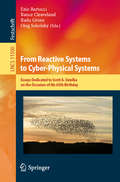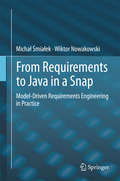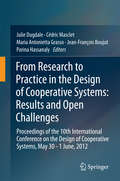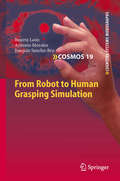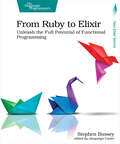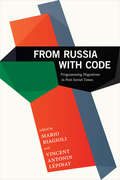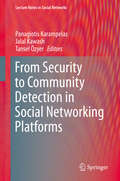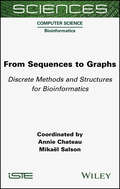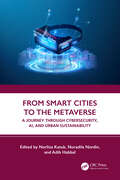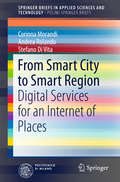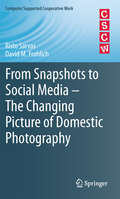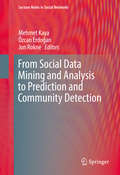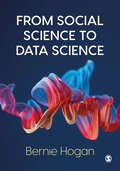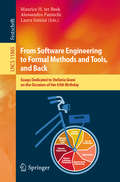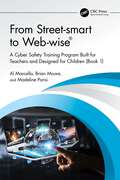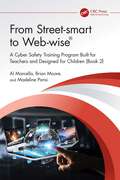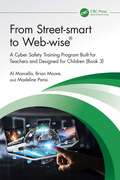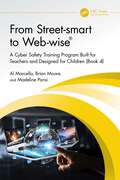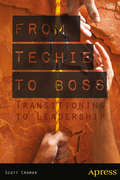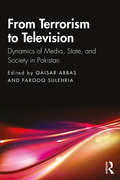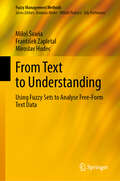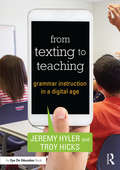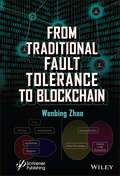- Table View
- List View
From Protest to President: A Social Justice Journey through the Emergence of Adult Education and the Birth of Distance Learning
by George A PruittFrom Protest to President describes an inspirational odyssey of a young, Black activist coming of age in Mississippi and Chicago in the tumultuous 1960s and '70s, culminating in a notable thirty-five-year presidency at Thomas Edison State University. From barbershop encounters with Malcolm X to death threats at Illinois State University and gunfire at Towson State, Pruitt provides a powerful narrative poised at the intersection of social justice, higher education and politics. He recounts leadership experiences at HBCUs and public universities across the country, as he advocated for autonomy at Morgan State and fought to preserve Tennessee State University. His steadfast activism, integrity and courage led to groundbreaking work in providing access to higher education for working adults and the military. From his days as a student protester in high school and college to his appearances on Capitol Hill, Pruitt has earned the reputation as a candid and influential leader in higher education.
From Reactive Systems to Cyber-Physical Systems: Essays Dedicated to Scott A. Smolka on the Occasion of His 65th Birthday (Lecture Notes in Computer Science #11500)
by Ezio Bartocci Oleg Sokolsky Rance Cleaveland Radu GrosuThis Festschrift is in honor of Scott A. Smolka, Professor in the Stony Brook University, USA, on the occasion of his 65th birthday. Scott A. Smolka made fundamental research contributions in a number of areas, including process algebra, model checking, probabilistic processes, runtime verification, and the modeling and analysis of cardiac cells, neural circuits and flocking behaviors. He is perhaps best known for the algorithm he and Paris Kanellakis invented for checking bi-simulation. The title of this volume From Reactive Systems to Cyber-Physical Systems reflects Scott's main research focus throughout his career. It contains the papers written by his closest friends and collaborators. The contributions cover a wide spectrum of the topics related to Scott's research scientific interests, including model repair for probabilistic systems, runtime verification, model checking, cardiac dynamics simulation and machine learning.
From Requirements to Java in a Snap
by Michał Śmiałek Wiktor NowakowskiThis book provides a coherent methodology for Model-Driven Requirements Engineering which stresses the systematic treatment of requirements within the realm of modelling and model transformations. The underlying basic assumption is that detailed requirements models are used as first-class artefacts playing a direct role in constructing software. To this end, the book presents the Requirements Specification Language (RSL) that allows precision and formality, which eventually permits automation of the process of turning requirements into a working system by applying model transformations and code generation to RSL. The book is structured in eight chapters. The first two chapters present the main concepts and give an introduction to requirements modelling in RSL. The next two chapters concentrate on presenting RSL in a formal way, suitable for automated processing. Subsequently, chapters 5 and 6 concentrate on model transformations with the emphasis on those involving RSL and UML. Finally, chapters 7 and 8 provide a summary in the form of a systematic methodology with a comprehensive case study. Presenting technical details of requirements modelling and model transformations for requirements, this book is of interest to researchers, graduate students and advanced practitioners from industry. While researchers will benefit from the latest results and possible research directions in MDRE, students and practitioners can exploit the presented information and practical techniques in several areas, including requirements engineering, architectural design, software language construction and model transformation. Together with a tool suite available online, the book supplies the reader with what it promises: the means to get from requirements to code "in a snap".
From Research to Practice in the Design of Cooperative Systems: Results and Open Challenges
by Parina Hassanaly Maria Antonietta Grasso Jean-François Boujut Cédric Masclet Julie DugdaleCOOP 2012 is the tenth COOP conference, marking twenty years from the first conference in 1992. In this special anniversary edition we asked researchers and practitioners to reflect on what have been the successes and the failures in designing cooperative systems, and what challenges still need to be addressed. We have come a long way in understanding the intricacies of cooperation and in designing systems that support work practices and collective activities. These advances would not have been possible without the concerted effort of contributions from a plethora of domains including CSCW, HCI, Information Systems, Knowledge Engineering, Multi-agent systems, organizational and management sciences, sociology, psychology, anthropology, ergonomics, linguistics, etc. The COOP community is going from strength to strength in developing new technologies, advancing and proposing new methodological approaches, and forging theories.
From Robot to Human Grasping Simulation
by Beatriz León Antonio Morales Joaquín Sancho-BruThe human hand and its dexterity in grasping and manipulating objects are some of the hallmarks of the human species. For years, anatomic and biomechanical studies have deepened the understanding of the human hand's functioning and, in parallel, the robotics community has been working on the design of robotic hands capable of manipulating objects with a performance similar to that of the human hand. However, although many researchers have partially studied various aspects, to date there has been no comprehensive characterization of the human hand's function for grasping and manipulation of everyday life objects. This monograph explores the hypothesis that the confluence of both scientific fields, the biomechanical study of the human hand and the analysis of robotic manipulation of objects, would greatly benefit and advance both disciplines through simulation. Therefore, in this book, the current knowledge of robotics and biomechanics guides the design and implementation of a simulation framework focused on manipulation interactions that allows the study of the grasp through simulation. As a result, a valuable framework for the study of the grasp, with relevant applications in several fields such as robotics, biomechanics, ergonomics, rehabilitation and medicine, has been made available to these communities.
From Ruby to Elixir
by Stephen BusseyElixir will change the way you think about programming. Use your Ruby experience to quickly get up to speed so you can see what all of the buzz is about. Go from zero to production applications that are reliable, fast, and scalable. Learn Elixir syntax and pattern matching to conquer the basics. Then move onto Elixir's unique process model that offers a world-class way to go parallel without fear. Finally, use the most common libraries like Ecto, Phoenix, and Oban to build a real-world SMS application. Now's the time. Dive in and learn Elixir. Whether you're a seasoned Ruby developer looking to expand your skill set or a programming beginner looking for a solid foundation in Elixir, this book has what you need to get up to speed quickly. Elixir is a functional language with a fairly small footprint. This makes it easier to learn and put into production than other languages. Plus, it's built on forty-year-old foundations that give your applications rock-solid stability. The first part of this book is all about developing expertise in the language. Learn about the core data types, build application data structures, enumerate over data, and use pattern matching to control the flow of an application. Elixir has an amazing process model that allows for (actually) easy parallel processing. Learn how to tap into this process model so you can leverage that power yourself. The second part of this book builds a real-world application using the most important libraries in a web developer's toolbox. Each library is compared to its similar Ruby library so you'll quickly see similarities and differences. We'll use Ecto, Phoenix, and Oban to build a SMS application powered by Twilio. What are you waiting for? Tap into your Ruby knowledge and start building scalable Elixir applications today. What You Need: You'll need Elixir 1.14+ and Erlang/OTP 24+ installed on a Mac OS X, Linux, or Windows machine.
From Russia with Code: Programming Migrations in Post-Soviet Times
by Mario Biagioli Vincent Antonin LépinayWhile Russian computer scientists are notorious for their interference in the 2016 US presidential election, they are ubiquitous on Wall Street and coveted by international IT firms and often perceive themselves as the present manifestation of the past glory of Soviet scientific prowess. Drawing on over three hundred in-depth interviews, the contributors to From Russia with Code trace the practices, education, careers, networks, migrations, and lives of Russian IT professionals at home and abroad, showing how they function as key figures in the tense political and ideological environment of technological innovation in post-Soviet Russia. Among other topics, they analyze coders' creation of both transnational communities and local networks of political activists; Moscow's use of IT funding to control peripheral regions; brain drain and the experiences of coders living abroad in the United Kingdom, United States, Israel, and Finland; and the possible meanings of Russian computing systems in a heterogeneous nation and industry. Highlighting the centrality of computer scientists to post-Soviet economic mobilization in Russia, the contributors offer new insights into the difficulties through which a new entrepreneurial culture emerges in a rapidly changing world. Contributors. Irina Antoschyuk, Mario Biagioli, Ksenia Ermoshina, Marina Fedorova, Andrey Indukaev, Alina Kontareva, Diana Kurkovsky, Vincent Lépinay, Alexandra Masalskaya, Daria Savchenko, Liubava Shatokhina, Alexandra Simonova, Ksenia Tatarchenko, Zinaida Vasilyeva, Dimitrii Zhikharevich
From Security to Community Detection in Social Networking Platforms (Lecture Notes in Social Networks)
by Jalal Kawash Panagiotis Karampelas Tansel ÖzyerThis book focuses on novel and state-of-the-art scientific work in the area of detection and prediction techniques using information found generally in graphs and particularly in social networks. Community detection techniques are presented in diverse contexts and for different applications while prediction methods for structured and unstructured data are applied to a variety of fields such as financial systems, security forums, and social networks. The rest of the book focuses on graph-based techniques for data analysis such as graph clustering and edge sampling. The research presented in this volume was selected based on solid reviews from the IEEE/ACM International Conference on Advances in Social Networks, Analysis, and Mining (ASONAM '17). Chapters were then improved and extended substantially, and the final versions were rigorously reviewed and revised to meet the series standards. This book will appeal to practitioners, researchers and students in the field.
From Sequences to Graphs: Discrete Methods and Structures for Bioinformatics
by Annie Chateau Mikaël SalsonIn order to study living organisms, scientists not only study them at an overall macroscopic scale but also on a more detailed microscopic scale. This observation, pushed to its limits, consists of investigating the very center of each cell, where we find the molecules that determine the way it functions: DNA (deoxyribonucleic acid) and RNA (ribonucleic acid). In an organism, DNA carries the genetic information, which is called the genome. It is represented as four-letter sequences using the letters A, C, G and T; based on these sequences, computer methods described in this book can answer fundamental questions in bioinformatics. This book explores how to quickly find sequences of a few hundred nucleotides within a genome that may be made up of several billion, how to compare those sequences and how to reconstruct the complete sequence of a genome. It also discusses the problems of identifying bacteria in a given environment and predicting the structure of RNA based on its sequence.
From Smart Cities to the Metaverse: A Journey through Cybersecurity, AI, and Urban Sustainability
by Norliza Katuk Noradila Nordin Adib HabbalThis book offers a comprehensive exploration of the convergence between smart city infrastructure and the emerging metaverse. This book highlights the importance of integrating advanced technologies such as artificial intelligence, virtual reality/augmented reality, and blockchain to enhance urban living experiences while addressing such innovations’ security and ethical challenges. Its applications span urban planning, transportation, education, historic preservation, and inclusive city development, making it an essential resource for modern urban development.The book covers many key areas critical to understanding and implementing smart cities and the metaverse. It starts with both domains’ foundational concepts and technological underpinnings, followed by a deep dive into the security infrastructure and challenges smart cities face. Cybersecurity is given special attention, exploring motives and methods of cyberattacks and proposing mitigation techniques and best practices. The book also examines AI chatbots, intelligent transportation, and the integration of digital twins, providing practical case studies and insights. Furthermore, it addresses the socioeconomic implications, governance, and ethical considerations, ensuring a holistic approach to the subject.The motivation for writing this book stems from the contributors’ recognition of the transformative potential of smart cities and the metaverse in creating sustainable, efficient, and inclusive urban environments. By bridging the gap between theoretical research and practical application, the contributors aim to equip researchers, policymakers, and technologists with the knowledge and tools needed to navigate and shape the future of urban living in a digitally interconnected world.
From Smart City to Smart Region
by Corinna Morandi Andrea Rolando Stefano Di VitaThis book offers a fascinating exploration of the relationship between information and communication technologies (ICTs) and spatial planning, expanding the concept of "urban smartness" from the usual scale of buildings or urban projects to the regional dimension. In particular, it presents the outcomes of research undertaken at Politecnico di Milano, in collaboration with Telecom Italia, that had three principal goals: to investigate the use of ICTs for the representation, promotion, management, and dissemination of an integrated system of services; to explore the spatial impacts of digital services at different scales (regional, urban, local); and to understand how a system of mobile services can encourage new spatial uses and new collective behavior in the quest for better spatial quality of places. Useful critical analysis of international case studies is also included with the aim of verifying the opportunities afforded by new digital services not only to improve the urban efficiency but also to foster the evolution of urban communities through enhancement of the public realm. The book will be a source of valuable insights for both scholars and local administrators and operators involved in smart city projects.
From Snapshots to Social Media - The Changing Picture of Domestic Photography
by Risto Sarvas David M. FrohlichFrom Snapshots to Social Media describes the history and future of domestic photography as mediated by technological change. Domestic photography refers to the culture of ordinary people capturing, sharing and using photographs, and is in a particular state of flux today as photos go digital. The book argues that this digital era is the third major chapter in the 170 year history of the area; following the portrait and Kodak eras of the past. History shows that despite huge changes in photographic technology and the way it has been sold, people continue to use photographs to improve memory, support communication and reinforce identity. The future will involve a shift in the balance of these core activities and a replacement of the family album with various multimedia archives for individuals, families and communities. This raises a number of issues that should be taken into account when designing new technologies and business services in this area, including: the ownership and privacy of content, multimedia standards, home ICT infrastructure, and younger and older users of images. The book is a must for designers and engineers of imaging technology and social media who want a better understanding of the history of domestic photography in order to shape its future. It will also be of value to students and researchers in science and technology studies and visual culture, as a fascinating case study of the evolving use of photographs and photographic technology in Western society.
From Social Data Mining and Analysis to Prediction and Community Detection
by Jon Rokne Mehmet Kaya Özcan ErdoǧanThis book presents the state-of-the-art in various aspects of analysis and mining of online social networks. Within the broader context of online social networks, it focuses on important and upcoming topics of social network analysis and mining such as the latest in sentiment trends research and a variety of techniques for community detection and analysis. The book collects chapters that are expanded versions of the best papers presented at the IEEE/ACM International Conference on Advances in Social Networks Analysis and Mining (ASONAM'2015), which was held in Paris, France in August 2015. All papers have been peer reviewed and checked carefully for overlap with the literature. The book will appeal to students and researchers in social network analysis/mining and machine learning.
From Social Science to Data Science: Key Data Collection and Analysis Skills in Python
by Bernie HoganFrom Social Science to Data Science is a fundamental guide to scaling up and advancing your programming skills in Python. From beginning to end, this book will enable you to understand merging, accessing, cleaning and interpreting data whilst gaining a deeper understanding of computational techniques and seeing the bigger picture. With key features such as tables, figures, step-by-step instruction and explanations giving a wider context, Hogan presents a clear and concise analysis of key data collection and skills in Python.
From Social Science to Data Science: Key Data Collection and Analysis Skills in Python
by Bernie HoganFrom Social Science to Data Science is a fundamental guide to scaling up and advancing your programming skills in Python. From beginning to end, this book will enable you to understand merging, accessing, cleaning and interpreting data whilst gaining a deeper understanding of computational techniques and seeing the bigger picture. With key features such as tables, figures, step-by-step instruction and explanations giving a wider context, Hogan presents a clear and concise analysis of key data collection and skills in Python.
From Software Engineering to Formal Methods and Tools, and Back: Essays Dedicated to Stefania Gnesi on the Occasion of Her 65th Birthday (Lecture Notes in Computer Science #11865)
by Alessandro Fantechi Maurice H. ter Beek Laura SeminiThis volume was published in honor of Stefania Gnesi’s 65th birthday. The Festschrift volume contains 32 papers written by close collaborators and friends of Stefania and was presented to her on October 8, 2019 one-day colloquium held in Porto, Portugal, The Festschrift consists of eight sections, seven of which reflect the main research areas to which Stefania has contributed. Following a survey of Stefania's legacy in research and a homage by her thesis supervisor, these seven sections are ordered according to Stefania's life cycle in research, from software engineering to formal methods and tools, and back: Software Engineering; Formal Methods and Tools; Requirements Engineering; Natural Language Processing; Software Product Lines; Formal Verification; and Applications.
From Street-smart to Web-wise®: A Cyber Safety Training Program Built for Teachers and Designed for Children (Book 1)
by Brian Moore Al Marcella Madeline ParisiIn a world where tiny fingers are as familiar with touchscreens as they are with crayons, ensuring our children’s safety online has never been more crucial. From Street‑smart to Web‑wise®: A Cyber Safety Training Program Built for Teachers and Designed for Children isn’t just another book – it’s a passionate call to action for teachers and a roadmap to navigate the digital landscape safely, with confidence and care.Written by authors who are recognized experts in their respective fields, this accessible manual is a timely resource for educators. Dive into engaging content that illuminates the importance of cyber safety, not only in our classrooms but extending into the global community.Each chapter is filled with practical examples, stimulating discussion points, and ready‑to‑use lesson plans tailored for students in kindergarten through second grade. Regardless of your technology skill level, this book will provide you with the guidance and the tools you need to make student cyber‑safety awareness practical, fun, and impactful.As parents partner with educators to create cyber‑secure spaces, this book stands as a framework of commitment to that partnership. It’s a testament to taking proactive steps in equipping our young learners with the awareness and skills they need to tread the digital world securely.By choosing From Street‑smart to Web‑wise®: A Cyber Safety Training Program Built for Teachers and Designed for Children, you position yourself at the forefront of educational guardianship, championing a future where our children can explore, learn, and grow online without fear. Join us on this journey to empower the next generation—one click at a time!
From Street-smart to Web-wise®: A Cyber Safety Training Program Built for Teachers and Designed for Children (Book 2)
by Brian Moore Al Marcella Madeline ParisiBook 2 continues as the tiny fingers in Book 1 Grades K-2 grow and become more familiar with online activities. The critical job of ensuring our children’s safety expands as students become more independent and begin to have greater online autonomy. From Street‑smart to Web‑wise®: A Cyber Safety Training Manual Built for Teachers and Designed for Children isn’t just another book — it’s a passionate call to action for teachers, a roadmap to navigate the digital landscape safely, with confidence and care.Written by authors who are recognized experts in their respective fields, this accessible manual is a timely resource for educators. Dive into engaging content that illuminates the importance of cyber safety, not only in our classrooms but extending into the global community.Each chapter is filled with practical examples, stimulating discussion points, and ready‑to‑use lesson plans tailored for students in third and fourth grades. Regardless of your technology skill level, this book will provide you with the guidance and the tools you need to make student cyber‑safety awareness practical, fun, and impactful.As parents partner with educators to create cyber‑secure spaces, this book stands as a framework of commitment to that partnership. It’s a testament to taking proactive steps in equipping our young learners with the awareness and skills they need to tread the digital world securely.By choosing From Street‑smart to Web‑wise®: A Cyber Safety Training Manual Built for Teachers and Designed for Children, you position yourself at the forefront of educational guardianship, championing a future where our children can explore, learn, and grow online without fear. Join us on this journey to empower the next generation — one click at a time!
From Street-smart to Web-wise®: A Cyber Safety Training Program Built for Teachers and Designed for Children (Book 3)
by Al Marcella Brian Moore Madeline ParisiIn Book 3, fifth and sixth graders are maturing, becoming more independent, and online activities are second nature. From Street‑smart to Web‑wise®: A Cyber Safety Training Manual Built for Teachers and Designed for Children isn’t just another book — it’s a passionate call to action for teachers. It is a roadmap to navigate the digital landscape safely, with confidence and care, as the critical job of ensuring students’ safety as the digital world expands.Written by authors who are recognized experts in their respective fields, this accessible manual is a timely resource for educators. This book helps us dive into engaging content that illuminates the importance of cyber safety, not only in our classrooms but also in the global community.Each chapter is filled with practical examples, stimulating discussion points, and ready‑to‑use lesson plans tailored for students in fifth and sixth grades. Regardless of your technology skill level, this book will provide you with the guidance and the tools you need to make student cyber‑safety awareness practical, fun, and impactful.As parents partner with educators to create cyber‑secure spaces, this book stands as a framework of commitment to that partnership. It’s a testament to taking proactive steps in equipping our young learners with the awareness and skills they need to tread the digital world securely.By choosing From Street‑smart to Web‑wise®: A Cyber Safety Training Manual Built for Teachers and Designed for Children, you position yourself at the forefront of educational guardianship, championing a future where our children can explore, learn, and grow online without fear. Join us on this journey to empower the next generation — one click at a time!
From Street-smart to Web-wise®: A Cyber Safety Training Program Built for Teachers and Designed for Children (Book 4)
by Al Marcella Madeline Parisi Brian MooreOur seventh and eighth graders are now "officially" teens, and online activities are second nature. From Street‑smart to Web‑wise®: A Cyber Safety Training Manual Built for Teachers and Designed for Children isn’t just another book. Teachers will find this book to be a road map to navigate the digital landscape safely, with confidence and care, as their critical job of ensuring students’ safety in a digital world expands.Dive into engaging content that illuminates the importance of cyber safety, not only in our classrooms but extending into the global community.Written by authors who are recognized experts in their respective fields, this accessible manual is a timely resource for educators. Each chapter is filled with practical examples and teacher tips, stimulating discussion points, and ready‑to‑use lesson plans tailored for students in seventh and eighth grades. Regardless of your technology skill level, this book will provide you with the guidance and the tools you need to make student cyber safety awareness practical, fun, and impactful.Parents consider educators their partners in creating cyber‑secure spaces. This book stands as a framework of commitment to that partnership whether you are in a middle school environment or in a child‑serving agency. It confirms proactive steps in equipping our young learners with the awareness and skills they need to tread the digital world securely.By choosing From Street‑smart to Web‑wise®: A Cyber Safety Training Manual Built for Teachers and Designed for Children, you position yourself at the forefront of educational guardianship, championing a future where our children can explore, learn, and grow online without fear. Join us on this journey to empower the next generation—one click at a time!
From Techie to Boss: Transitioning to Leadership
by David Jacobs Scott CromarFrom Techie to Boss teaches technical people who are making or mulling the transition from team player to team leader all the management techniques and soft leadership skills they never needed before-but need now, pronto. Veteran team lead and project manager Scott Cromar lays out the classical management training course, but stripped down to precisely the essentials that techies need to start managing on the fly. He gets it that a front-line techie getting a field promotion to team leader just doesn't have the time to wade through an MBA textbook bulging with irrelevant material. The author appreciates how you got to the place where you need this book. Management tapped you instead of some experienced manager from the outside because you know the technical challenges, company culture, and team players better than anyone else: you're ready to hit the ground running. But the skills that make you an excellent techie are not sufficient to make you a successful manager. The rules of your world have abruptly changed. You will now be judged not by your puzzle-solving elegance but by how effectively your team contributes to the organization's bottom line. From Techie to Boss shows you how to translate and adapt the analytic skills that made you an outstanding techie to your new responsibilities as a technical manager. Even more crucially, this book teaches you a whole new set of interpersonal, organizational, and metrical skills you never needed before, but without which you cannot succeed as a manager.
From Terrorism to Television: Dynamics of Media, State, and Society in Pakistan
by Qaisar AbbasThis book unpacks the media dynamics within the socio-cultural, political, and economic context of Pakistan. It provides an in-depth, critical, and scholarly discussion of contemporary issues such as media, state, and democracy in Pakistan; freedom of expression in Pakistani journalism; Balochistan as a blind spot in mainstream newspapers; media control by state institutions; women and media discourses; TV talk shows and coverage of Kashmir; feminist narrative and media images of Malala Yousufzai and Mukhtaran Mai; jihad on screen; and Osama bin Laden’s death on screen, to understand the relation between media and terrorism. The book covers diverse media types including TV, radio, newspapers, print media, films, documentary, stage performance, and social media. Detailed, interdisciplinary, analytical, and with original perspectives from journalists as well as academics, this volume will be useful to scholars and researchers of media studies, Pakistan studies, politics and international affairs, military and terrorism studies, journalism and communication studies, and South Asian studies. It will also interest general readers, policy makers, and those interested in global journalism, mass media, and freedom of expression.
From Text to Understanding: Using Fuzzy Sets to Analyse Free-Form Text Data (Fuzzy Management Methods)
by Miroslav Hudec Miloš Švaňa František ZapletalSocial media and other sources of text data are still underutilized resources in public decision-making. Most public organizations and governmental bodies rely mainly only surveys, interviews and other traditional methods for gathering opinions. One issues is a lack of easy-to-use tools for mass text data processing that would enable these organizations to process and understand this type of data. This book introduces a novel text data analysis framework designed for public decision making, specifically on the level of municipalities. The framework combines sentiment analysis with topic modelling and a fuzzy-based approach for capturing the diversity in sentiment arising from the fact that different people have different opinions on a given topic. The book is recommended for practitioners in public decision making as well as researchers analyzing large amounts of text data in order to understand people&’s opinions.
From Texting to Teaching: Grammar Instruction in a Digital Age
by Troy Hicks Jeremy HylerDon’t blame technology for poor student grammar; instead, use technology intentionally to reach students and actually improve their writing! In this practical book, bestselling authors Jeremy Hyler and Troy Hicks reveal how digital tools and social media – a natural part of students’ lives – can make grammar instruction more authentic, relevant, and effective in today’s world. Topics Covered: Teaching students to code switch and differentiate between formal and informal sentence styles Using flipped lessons to teach the parts of speech and help students build their own grammar guides Enlivening vocabulary instruction with student-produced video Helping students master capitalization and punctuation in different digital contexts Each chapter contains examples, screenshots, and instructions to help you implement the ideas. With the strategies in this book, you can empower students to become better writers with the tools they already love and use daily. Additional resources and links are available on the book’s companion wiki site: textingtoteaching.wikispaces.com
From Traditional Fault Tolerance to Blockchain
by Wenbing ZhaoThis book covers the most essential techniques for designing and building dependable distributed systems, from traditional fault tolerance to the blockchain technology. Topics include checkpointing and logging, recovery-orientated computing, replication, distributed consensus, Byzantine fault tolerance, as well as blockchain. This book intentionally includes traditional fault tolerance techniques so that readers can appreciate better the huge benefits brought by the blockchain technology and why it has been touted as a disruptive technology, some even regard it at the same level of the Internet. This book also expresses a grave concern on using traditional consensus algorithms in blockchain because with the limited scalability of such algorithms, the primary benefits of using blockchain in the first place, such as decentralization and immutability, could be easily lost under cyberattacks.

